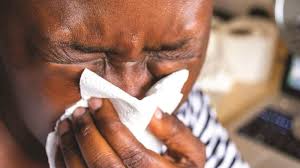Hello Millenial Readers,
In the past few weeks, there has been a persistent flu that seems to be creeping up in the streets of Kenya. If you are keen enough, you will notice a good number of people blowing their noses, coughing and some even complaining of a sore throat.

Maybe it’s your relative, a classmate or even the person seated next to you on the matatu. Could it be that the pandemic is coming back or is it just a regular flu?
About The Flu
According to the Kenya Medical Research Institute (KEMRI), the past two decades have been characterized by a pattern of increased cases of Influenza in two distinct seasons yearly. From March and May, and from July to October/November. As more hospitals record cases of Influenza, there have been close to zero incidents of COVID-19 infections reported. It is therefore correct to say that we are in the middle of an Influenza outbreak and not a COVID-19 epidemic.
Influenza, also known as the ‘Swine flu’ (H1N1) is a respiratory infection caused by an Influenza virus; spreading rapidly, to even advance to the global level, during its peak season. The most common way people catch the flu is by getting too close to a person with the showing Influenza respiratory symptoms. For that reason, individuals who are already infected, are advised to cover their mouth and nose with a tissue while coughing or sneezing and immediately dispose of it after use. Scientifically, the flu spreads when tiny airborne droplets from the sneezes and coughs of an infected person, are breathed in by an uninfected individual. Similarly, one may get infected by touching a substance contaminated by the virus and then touching their mouth, nose or ears.

Symptoms of Influenza
A person infected by Influenza is most likely to show the following symptoms:
- Runny nose
- Headache
- Fever
- Fatigue
- Loss of appetite
- Vomiting/ diarrhoea
- Insomnia
- Shortness of breath
- Dry cough
- Sensitivity to light
If you find yourself showing these symptoms, it is wise to visit a medical professional before making any type of self-diagnosis.
Groups that are most likely to be at a higher risk of severe respiratory complications include the elderly population, young infants, pregnant women, health care workers, individuals with chronic health conditions i.e. Diabetes and asthma, immunocompromised individuals i.e. persons living with HIV/AIDS or Cancer and residents living in nursing homes. These groups are therefore advised to prioritize preventive measures such as taking vaccines since the infection could lead to a fatal outcome.

What Does This Mean For Gen Z?
The effects of the Influenza outbreak cuts across the Kenyan population. Here are four distinct ways the outbreak has affected the Gen Z generation.
1. Health impacts
Young adults, whose age lies within the Gen Z bracket, are said to have a generally stronger immune system than the rest of the population. Even so, the Influenza virus is easily transferrable and the symptoms are not pleasant to bear. For example, fatigue and abnormal tiredness make the body unproductive and unable to accomplish daily tasks.
2. Psychological effect
Suffering from Influenza can easily be associated with anxiety, stress and worry due to the physical, social and economic consequences caused. Helplessness is also a common feeling, since one may require a lot of support from other groups: your friends, classmates and family after getting infected. Even so, isolation may be experienced as the infected individual takes time to recuperate. Unintentional isolation comes with feelings of loneliness and anxiety, hence mental health may be affected.
3. Social life interruptions
Absenteeism from school or work is prevalent during the flu season. One may need to take a few days of rest for the purpose of recovery or to take care of a loved one. While work and education are the most common areas of life, Gen Z social life could also be largely interrupted, limiting communal leisure time spent on road trips, hiking, swimming among others. Influenza outbreaks discourage large gatherings and crowds, bringing about a lifestyle adjustment challenge for Gen Z.
4. Creative responses
The Influenza outbreak has also posed a favourable opportunity for Gen Z to explore their creative side to solve nationwide challenges. Through art, music, media and literature, Gen Z can express themselves adequately. This strategic yet unadorned type of communication goes a long way in creating awareness and educating the public.

Final Thoughts
The consequences of this illness have proved to be severe to an extent, however, Gen Z carries the reputation of turning around even the worst situations in ways that, inspire, educate and entertain society.
Remember to take care of yourself during this season.
Cynthia ❤❤❤

